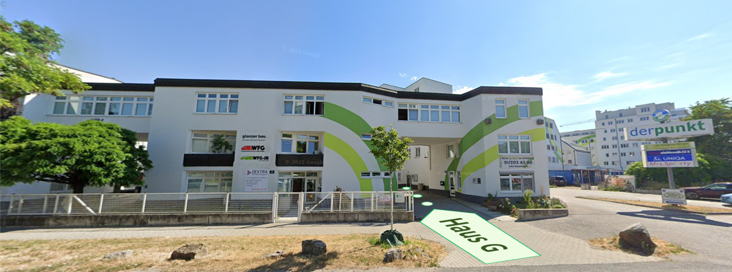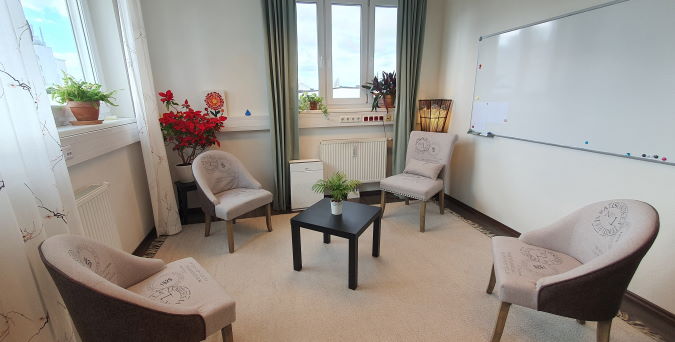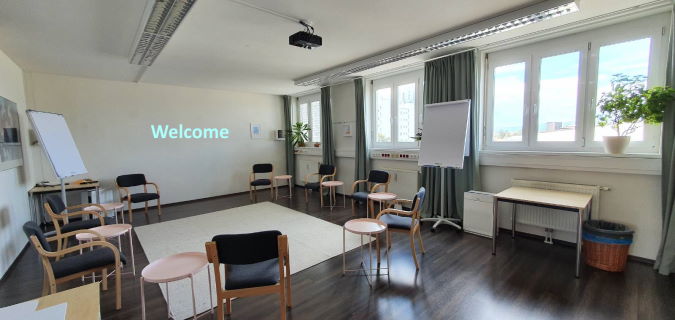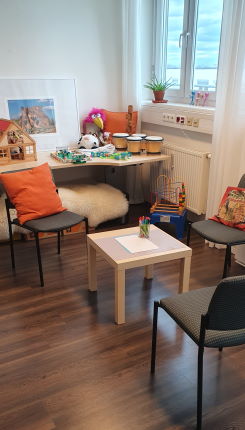Psychotherapy means dealing with your thinking patterns, feelings and related actions in order to bring about change. Goals for therapy are for instance gaining insights, overcoming difficulties, improving joy, well-being or quality of relationships. The client and therapist form an alliance to work together on these goals, challenges and development tasks. With the terms client and therapist we address both men and women, as well as the other genders.
Mehr / More
On being human
To begin with, to understand how psychotherapy works, it is useful to keep in mind some important features of being human.
1. We are relational beings
Firstly, we think of people as relational beings. We have been in relationship from birth, and even before that – with our environment, with people who are close and important to us. After all, our entire development and our humanity is in relation to others – people and environment.
2. We are organised by feelings
We have feelings, which we also perceive. Feelings like fears, joy, jealousy, envy, sadness, love, and so forth arise in the interaction between us and our environment. These emotional states act on the one hand within our bodies and on the other hand they affect our behaviours and actions, and therefore our relationships and other people.
3. We understand and make sense
In addition, we are searching for and making sense from our experiences. In other words, we try to understand what has happened what is currently happening and what will or could happen in the future. In short, we aim to orientate us in our life and in our world.
4. We act into the world
Following from this understanding, based on our being-oriented-in-the-world, we act within the scope of our possibilities, our values and according to our feelings. It is through these actions that we solve problems and create the beautiful things in life.
5. We learn and develop
Furthermore, we, our relationships, our feelings, our understandings and actions are not constant, but constantly emergent and developing. Because of this we can experience personal growth and make our lives meaningful.
At any given moment in time we are however only partially aware of the above characteristics of being human. In other words, many aspects of our thinking, feeling and acting remain unconscious.
On the whole, these perceptions and thoughts about relationships, feelings, understandings, actions, our being-oriented-in-the-world and our development, conscious and unconscious, are what we sometimes call psyche (from Greek ‘spirit’).
How psychotherapy works
We have dealt with being human and the psyche, so that we can now begin to outline how psychotherapy works. In doing so, we will establish the relationship between the psychotherapeutic effects and the above-mentioned characteristics of being human.
1. Working in and with relationships
Psychotherapy works because of the quality and experience of the relationship or alliance that the client and therapist can build together. The level of attention and mindfulness with which the client and therapist deal with relationships is also important.
2. Expressing emotions and changing how we feel
Psychotherapy offers a secure frame, which provides room also for difficult feelings and experiences. Consequently, these experiences and feelings can be looked at, worked with or processed. In addition, psychotherapy helps to raise awareness and to influence how our feelings and experiences affect our lives.
3. Creating insights and making sense
Psychotherapy helps to understand our relationships and environments or to extend our respective understandings. For example, we can deal with how we usually orientate or make sense and what thoughts and beliefs we hold about ourselves. We can then question or change these taken for granted perspectives and beliefs.
4. Inviting agency and choice
In addition, psychotherapy can make us aware of our actions and behavioural patterns. This enables resources such as skills, abilities or talents to be recognised and used better. On the other hand, less productive modes of acting can be identified, evaluated and changed.
5. Supporting development and growth
Finally, all of these mechanisms work together in a development process. The therapist protects, supports and promotes this process on various levels.
The effect and effectiveness of psychotherapy is empirically well-established.
Systemic psychotherapy, counselling and coaching – about our English service in Vienna
Our main working method is systemic therapy, a psychotherapeutic approach legally recognised in Austria. The systemic method and practice are also utilised in other contexts such as counselling, coaching, team-development etc. In our practice in Vienna we offer psychotherapy, coaching and other services in English and in German.
In systemic psychotherapy and counselling, specific attention is paid to relationships, communication and language, i.e. all forms of interaction. Significantly, changes and developments in our being-a-person and in our relating-with-others are understood as connected. With this in mind, attending to how people relate, do things together and influence each other, this form of therapy often opens up new and useful insights and opportunities. As a result, helpful development processes can be engaged in both on a personal and on a relationship level.
Based on what is said above, a systemic way of working is particularly suitable for understanding and changing problems in relation to others, to our living situation and our environment. This approach expands our understanding of our own situation and also helps to understand the position of others, which is often very useful and relieving.
Systemic practice in different settings
As mentioned above a systemic approach is used in various therapy, counselling and coaching situations, so-called settings.
In individual therapy, a systemic approach helps, generally speaking, to understand and change one’s own being, thinking, feeling and acting, how it relates to others and the environment. Important contexts such as, for instance, current patterns of relationships with family or friends, past relationship experiences, the family of origin, or work life are here attended to.
The way in which systemic coaching works is methodically similar, however the focus of the work is different. The primary focus in coaching is often to achieve a particular goal and matters of personal emotional experiences are of secondary importance. In business coaching, for example, the design of the organisational system itself can be in the focus of the work.
Furthermore, the systemic approach is particularly suited to work directly with relationships. In family therapy, couples therapy and marriage counselling, but also in team development, people can work together on a problem or challenge. In this process, in addition to the discussion of content, they can also develop the way in which they want to be dealing with each other. Consequently, relationships become visible and can be shaped in two ways, on the one hand at the level of the problem and on the other hand in the communication with each other.
Sources:
Lambert, M. J. (2013). Outcome in Psychotherapy: The Past and Important Advances. Psychotherapy, 50, 42-51.
Rosian K, Winkler R. (2017) Psychotherapie – Begriffe, Wirkfaktoren und ein deutschsprachiger Ländervergleich zu gesetzlichen Regelungen. LBI-HTA Projektbericht Nr.: 93. Wien: Ludwig Boltzmann Institut für Health Technology Assessment.

















